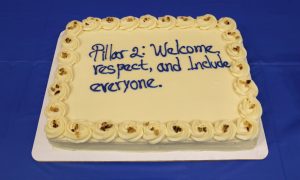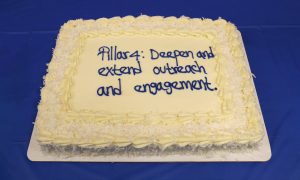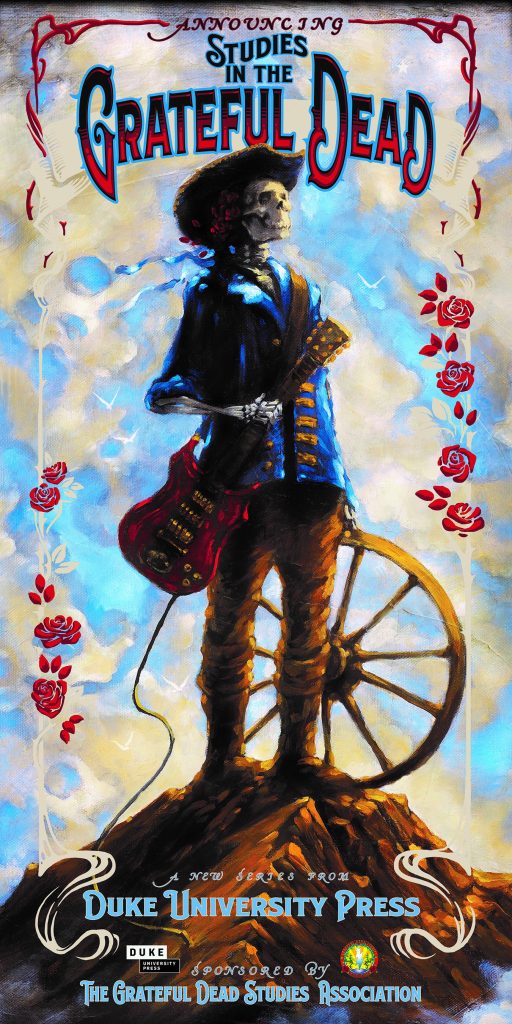 Two Events Launch New Book Series on the Grateful Dead
Two Events Launch New Book Series on the Grateful Dead
To celebrate the launch of a new book series from Duke University Press, Studies in the Grateful Dead, the Libraries hosted two author talks this semester exploring the iconic rock band’s lasting impact on American culture and the “long strange trip” their music is still taking today.
Edited by Nicholas G. Merriweather, Executive Director of the Grateful Dead Studies Association and former Grateful Dead Archivist at the University of California–Santa Cruz, the new book series explores the musical and cultural significance, impact, and achievement of the Grateful Dead while reinventing the academic and popular discourse devoted to the band.
In February, author Michael Kaler (University of Toronto Mississauga) visited campus to discuss his book Get Shown the Light: Improvisation and Transcendence in the Music of the Grateful Dead. A second author talk in April featured independent scholar John Brackett discussing Live Dead: The Grateful Dead, Live Recordings, and the Ideology of Liveness.
Duke has several notable connections with the Grateful Dead, who performed at the university five times over the years. The jam band’s 1978 concert at Cameron Indoor Stadium is widely regarded as one of their best shows of the decade, according to Eric Mlyn of Duke’s Sanford School of Public Policy, who also teaches a popular first-year seminar about the Dead.
Highlighting Black Lives in the Archives
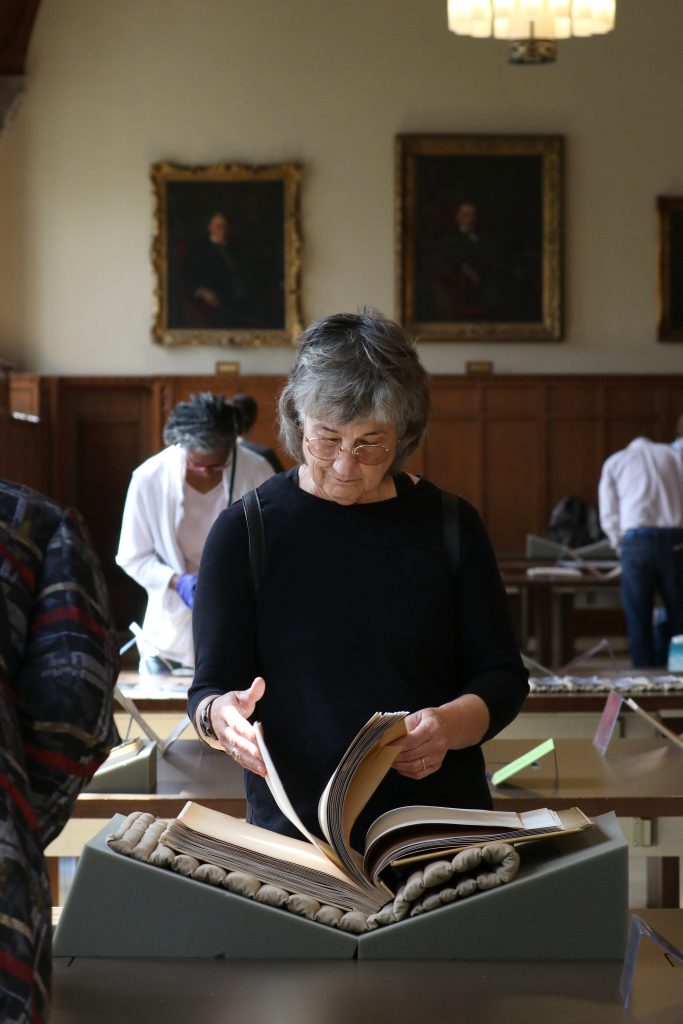 Every April, the John Hope Franklin Research Center in the Rubenstein Library hosts an open house inviting the public to get a hands-on feel for Black history. From rare first-edition books, to published works exploring Black history in Durham, to publications by Black students at Duke, visitors are encouraged to browse, touch, and explore the richness of Black culture preserved in the archives.
Every April, the John Hope Franklin Research Center in the Rubenstein Library hosts an open house inviting the public to get a hands-on feel for Black history. From rare first-edition books, to published works exploring Black history in Durham, to publications by Black students at Duke, visitors are encouraged to browse, touch, and explore the richness of Black culture preserved in the archives.
Highlights from this year’s Black Lives in Archives Open House included an 1853 first edition of the Narrative of Sojourner Truth, rare pamphlets by journalist and activist Ida B. Wells, and early twentieth-century photographs by Michael Francis Blake, one of the first Black studio photographers in Charleston, South Carolina.
“The difference between an archive and a museum is that we want you to touch our things,” said John Gartrell, who directs the Franklin Center and organizes the annual event. “Here, we encourage you to hold them and get to know what’s within.”
Photojournalist Wins Rubenstein Library Digital Storytelling Award
Photojournalist and documentarian Roderico “Rode” Yool Díaz is the winner of this year’s Digital Storytelling Award presented by the Rubenstein Rare Book & Manuscript Library at Duke University.
Yool Díaz received the award for his digital project documenting the 2012-2015 genocide trials against former Guatemalan dictator Efraín Ríos Montt. The project includes photos, video, and audio recordings of the trial proceedings, the reading of the verdict, and Ríos-Montt and his legal team reacting to the verdict.

“Trials are such an important and integral element of the human rights movement going back to Nuremberg,” said Patrick Stawski, Human Rights Archivist at the Rubenstein Library. “The Human Rights Archive has extensive documentation on trials from around the world, but Rode’s project reminds us that trials are not just procedural. His images capture an insurgent, emotional, historical event, one that is simultaneously public yet intimate and affectively human through and through.”
The Rubenstein Library Digital Storytelling Award is co-sponsored by the Human Rights Archive and the Archive of Documentary Arts at the David M. Rubenstein Rare Book & Manuscript Library. The award seeks to support outstanding documentary artists/activists exploring human rights and social justice, while expanding the digital documentary holdings in the archive and ensuring long-term preservation and access to their work. Winners receive $2,500 and are invited to present their work at Duke.
Civil Rights History Lessons with Duke in D.C.
Civic engagement and grassroots movements have fundamentally shaped our nation’s history. That was the theme of a sold-out Duke alumni event hosted by the Libraries this April at the Cosmos Club in Washington, D.C. The event highlighted the work of the Movement History Initiative (MHI), a collaboration between the SNCC Legacy Project and Duke University that brings together activists, academics, and archivists based in the Rubenstein Library’s John Hope Franklin Research Center.

The MHI partnership was formed in 2013 to present a different narrative of the Civil Rights Movement, one that tells that story from the ground up and the inside out. The goals are threefold: to document and preserve the legacy of Student Nonviolent Coordinating Committee (SNCC) as part of the Black freedom struggle of the 1960s; to pass on the informational wealth of veteran civil rights activists to the next generation of grassroots organizations; and to engage today’s activists in the preservation of their own history.
Among the distinguished speakers at the Cosmos Club were several Duke alumni, including trustee Lisa Borders T’79, historians Wesley Hogan G’95 ’00 and Hasan Kwame Jeffries G’97 ‘02, David M. Rubenstein T’70, as well as SNCC veterans Jennifer Lawson, Courtland Cox, and others. The conversation offered insights about SNCC’s history and accomplishments, and about how ordinary people can take action to make their own lives and communities more just today.
Fun fact: Duke’s own Dr. John Hope Franklin, for whom the Franklin Research Center was named, was the first African American to be elected a member of the prestigious Cosmos Club, in 1962.
Exploring the Crystal Coast at Duke’s Marine Lab
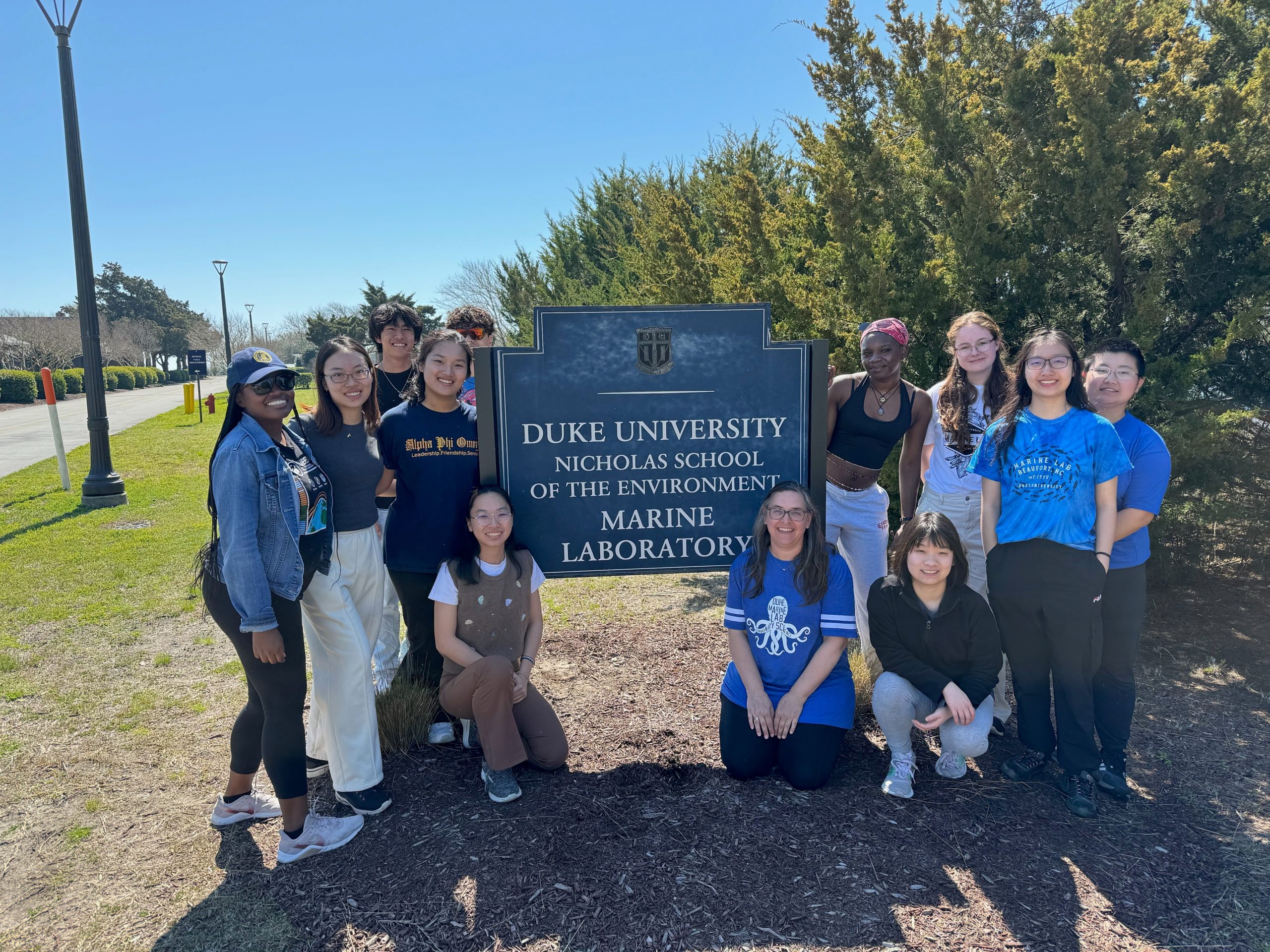
Spring break is a popular beach week for Duke undergraduates. But not all beaches are the same. Jodi Psoter, Librarian for Marine Science and Head of the Pearse Memorial Library (kneeling, center), led a team of Duke undergrads and graduate students on a “Spring Breakthrough” that week, learning about the history, science, and people of Beaufort, North Carolina, and its surrounding communities. Spring Breakthrough is a unique Duke experience offering undergraduates the chance to explore new ideas and interests in a fun and grade-free way, led by members of the Duke community. While on their adventures, the students had several up-close animal encounters: dolphins, wild horses, crabs, sea turtles, jellyfish, sting ray, and even a pet squirrel.
50 Years of Libraries Assembly
 As Duke celebrates its centennial in 2024, we’ve been looking back at our own library milestones through the years.
As Duke celebrates its centennial in 2024, we’ve been looking back at our own library milestones through the years.
This year we’re proud to observe a half-century of Libraries Assembly, the organization for all full- and part-time staff across Duke’s campus libraries. Libraries Assembly offers connections and partnerships with co-workers, information about Duke and its libraries for new employees, advocacy for staff in library and university affairs, and professional development opportunities such as speakers, panels, and workshops.
The organization looks a little different than it did fifty years ago, but so does our staff. To mark the occasion, Libraries Assembly hosted a panel of current and retired library staff reflecting on the history and contributions of the group, along with an exhibit at the entrance of Perkins Library. Today, Libraries Assembly’s committees and members-at-large continue to advocate for and promote the work of all the staff who keep Duke’s libraries running, year in and year out.
We Don’t Like to Eat Our Own Words…
… unless they’re cake. In February, library staff celebrated our new strategic plan with different flavored cakes for each of the plan’s main pillars. It was a good way to “internalize” our new priorities.
See the feature on our new strategic plan in this issue.



